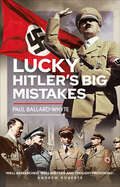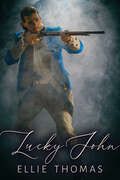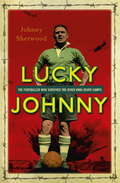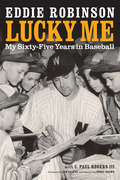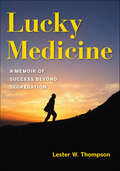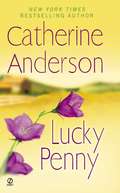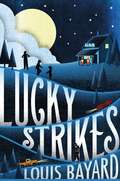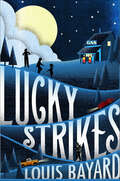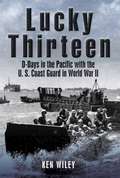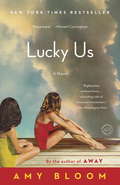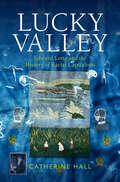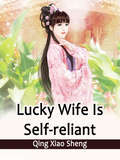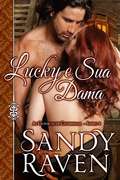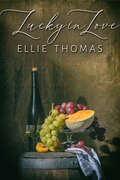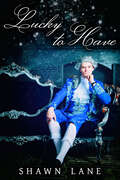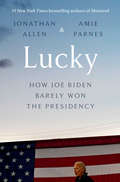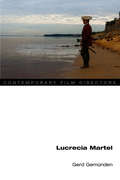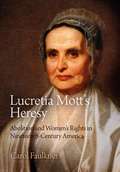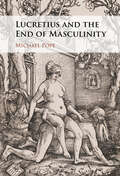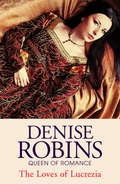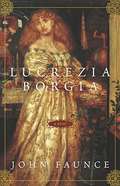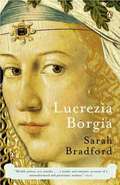- Table View
- List View
Lucky Hitler's Big Mistakes
by Paul Ballard-WhyteAdolf Hitler’s Great War military experiences in no way qualified him for supreme command. Yet by July 1940, under his personal leadership the Third Reich’s armed forces had defeated Poland, Czechoslovakia, Holland, Denmark, Norway, Belgium and France. The invasion of Great Britain was a distinct reality following Dunkirk. Hungary, Bulgaria and Romania had become allies along with the acquiescent military powers of Mussolini’s Italy and Franco’s Spain. These achievements prompted Field Marshal Willem Keitel, the Wehrmacht’s Chief of Staff, to pronounce Hitler to be ‘the Greatest Commander of all time’. Storm clouds were gathering, most notably the disastrous decision to tear up the treaty with the Soviet Union and launch Operation Barbarossa in 1941. As described in this meticulously researched and highly readable book, Hitler’s blind ideology, racist hatred and single-mindedness led him and his allies inexorably to devastating defeat. How far was it good luck that gave Hitler his sensational early political and military successes? Certainly fortune played a major role in his survival from many assassination attempts and sex scandals. The author concludes, from 1941 onwards, the Fuhrer’s downfall was entirely attributable to military misjudgments that he alone made. Lucky: Hitler’s Big Mistakes exposes the enigmatic Dictator for what he really was – incredibly lucky and militarily incompetent.
Lucky John
by Ellie ThomasOwen Montgomery has been a landless drifter since the Royalist defeat at the Battle of Worcester nine years previously when he was seventeen. Since then, he has lingered abroad as an insignificant follower in the retinue of exiled King Charles.In the spring of 1660, Owen travels across England as an envoy on behalf of the King. Despite this important diplomatic mission, Owen regards himself as little better than the highwaymen he encounters on the lawless roads.During a brief stop at an obscure roadside inn, he encounters Lucky John, a bullied skivvy with a sweet nature who makes a lasting impression. When Owen impulsively rescues John from his unkind employer, he has no idea of the impact the lad will make on his lonely existence.Will Owen reject this chance to open up and share his life? And can Owen be convinced he deserves John’s love?
Lucky Johnny: The Footballer who Survived the River Kwai Death Camps
by Johnny SherwoodIn 1938 Johnny Sherwood was a young professional footballer on the brink of an England career, touring the world with the all-star British team the Islington Corinthians. By 1942 he was a soldier surrendering to the Japanese at the siege of Singapore. Taken prisoner he was sent to a POW camp deep in the heart of the Thai jungle, where he was starved, beaten, and forced to build the notorious 'railway of death' on the River Kwai. Johnny kept his and his men's spirits up with tales of his footballing past, even organising matches until he and the other prisoners became too weak to play. One day, he even encountered a brutal Japanese guard, and was shocked to recognise him as a Japanese footballer Johnny had played against. Many years after Johnny's death, his grandson Michael discovered an old manuscript hidden in the attic of his mother's house. It was Johnny's own account of his wartime experiences - the story too horrific to reveal in full to his loved ones. In the tradition of bestselling memoirs like The Railway Man, Lucky Johnny is an inspirational tale of survival against the odds.
Lucky Johnny: The Footballer who Survived the River Kwai Death Camps
by Johnny SherwoodIn 1938 Johnny Sherwood was a young professional footballer on the brink of an England career, touring the world with the all-star British team the Islington Corinthians. By 1942 he was a soldier defending Singapore against the Japanese. Taken prisoner he was sent to a POW camp deep in the heart of the Thai jungle, where he was starved, beaten, and forced to build the notorious 'railway of death' on the River Kwai. Johnny kept his and his men's spirits up with tales of his footballing past, even organising matches until he and the other prisoners became too weak to play. One day, he encountered a brutal Japanese guard, and was shocked to recognise him as a Japanese footballer Johnny had played against. Despite the inhumane treatment he received at the hands of the guards, and the trials the POWs continued to face even after liberation, Johnny's story is an inspirational tale of survival against the odds. Many years after Johnny's death, his grandson Michael discovered an old manuscript hidden in the attic of his mother's house. It was Johnny's own account of his wartime experiences - the story too horrific to reveal to his loved ones. Now, in publishing Johnny's memoirs, Michael is finally fulfilling Johnny's wish that the world should know the truth about his traumatic time as a POW, and his long journey back to civilisation.
Lucky Me: My Sixty-Five Years in Baseball
by Eddie Robinson C. Paul RogersEddie Robinson&’s career lasted sixty-five years and spanned the era before and during World War II, integration, the organization of the players union, expansion, use of artificial turf, free agency, labor stoppages, and even the steroid era. He was a Minor League player, a Major League player, a coach, a farm director, a general manager, a scout, and a consultant. During his six and a half decades in baseball, he knew, played with or against, or worked for or with many of baseball&’s greats, including Hank Aaron, Yogi Berra, Joe DiMaggio, Bob Feller, Rogers Hornsby, Mickey Mantle, Satchel Paige, Jackie Robinson, Babe Ruth, Tris Speaker, George Steinbrenner, Casey Stengel, Bill Veeck, and Ted Williams. The lively autobiography of Robinson, Lucky Me highlights a career that touched all aspects of the game from player to coach to front-office executive and scout. In it Robinson reveals for the first time that the 1948 Cleveland Indians stole the opposition&’s signs with the use of a telescope in their drive to the pennant. This edition features a new afterword by C. Paul Rogers III.
Lucky Medicine: A Memoir of Success beyond Segregation (Well House Bks.)
by Lester W. ThompsonA remarkable, personal glimpse of Black student life at Indiana University in the early 1960s. In 1961, a skinny African American boy from Indianapolis arrived at Indiana University Bloomington determined to become a doctor. For the next three years, Lester Thompson kept a detailed, intimate diary of his journey to graduation. In Lucky Medicine, Lester returns to his long-ago journal and, with honesty, humor, and a healthy dose of rueful self-reflection, shares stories from his college years at Indiana University. Fascinating glimpses emerge of Black Greek life at the time, including the building of the Kappa Alpha Psi fraternity house and the successes, struggles, and social lives of its members. Lester's student years were driven by hard work, but also bustled with fun and drama. He recalls his time studying at the university library, falling in and out of love many times, becoming friends with fellow fraternity brother Booker T. Jones, a truly memorable invitation extended to meet with George Wallace, and an epic, no-holds-barred brawl with limestone cutters at the 24-Hour Grill. Lucky Medicine offers a closeup, unforgettable look at IU student life just before the sweeping social changes of the 1960s, when students of color accounted for less than 2 percent of the Indiana University's student body.
Lucky Penny
by Catherine AndersonTo support her orphaned niece, impoverished Brianna O'Keefe accepts work with a Colorado rancher. To guard herself from unwanted attention, she resorts to a harmless little lie: that she's married to a Denver gold miner named David Paxton. But when her "husband" shows up, Brianna is stunned--not the least by her desire. . .
Lucky Strikes
by Louis BayardWith her mama recently dead and her pa sight unseen since birth, fourteen-year-old Amelia is suddenly in charge of her younger brother and sister--and of the family gas station. Harley Blevins, local king and emperor of Standard Oil, is in hot pursuit to clinch his fuel monopoly. To keep him at bay and keep her family out of foster care, Melia must come up with a father--and fast. And so when a hobo rolls out of a passing truck, Melia grabs opportunity by its beard. Can she hold off the hounds till she comes of age?
Lucky Strikes
by Louis BayardWith her mama recently dead and her pa sight unseen since birth, fourteen-year-old Amelia is suddenly in charge of her younger brother and sister--and of the family gas station. Harley Blevins, local king and emperor of Standard Oil, is in hot pursuit to clinch his fuel monopoly. To keep him at bay and keep her family out of foster care, Melia must come up with a father--and fast. And so when a hobo rolls out of a passing truck, Melia grabs opportunity by its beard. Can she hold off the hounds till she comes of age?
Lucky Thirteen: D-Days in the Pacific with the U. S. Coast Guard in World War II
by Ken WileyThis story is about the U .S. Coast Guard's role in World War II, as told from the perspective of a teenage boy who played a part in that great global struggle. It is also about an unheralded boat that played an insignificant and yet very important role in America's response to restoring freedom to a part of the world enslaved by an evil tyranny. Lucky 13--my boat--was a weapon specifically designed and mass produced in the United States to bridge the 6,000-mile ocean gap and carry the war to the shores of the enemy. The "Higgins" boats were lowered from troop ships with one mission: to carry the infantry and equipment the last seven miles of the long and perilous journey onto the beaches of enemy-held islands.
Lucky Us
by Amy BloomLucky Us is a brilliantly written, deeply moving, fantastically funny novel of love, heartbreak, and luck. Disappointed by their families, Iris, the hopeful star and Eva the sidekick, journey through 1940s America in search of fame and fortune. Iris's ambitions take the pair across the America of Reinvention in a stolen station wagon, from small-town Ohio to an unexpected and sensuous Hollywood, and to the jazz clubs and golden mansions of Long Island. With their friends in high and low places, Iris and Eva stumble and shine though a landscape of big dreams, scandals, betrayals, and war. Filled with gorgeous writing, memorable characters, and surprising events, Lucky Us is a thrilling and resonant novel about success and failure, good luck and bad, the creation of a family, and the pleasures and inevitable perils of family life, conventional and otherwise. From Brooklyn's beauty parlors to London's West End, a group of unforgettable people love, lie, cheat and survive in this story of our fragile, absurd, heroic species.
Lucky Valley: Edward Long and the History of Racial Capitalism (Critical Perspectives on Empire)
by Catherine HallWhy does Edward Long's History of Jamaica matter? Written in 1774, Long's History, that most 'civilised' of documents, attempted to define White and Black as essentially different and unequal. Long deployed natural history and social theory, carefully mapping the island, and drawing on poetry and engravings, in his efforts to establish a clear and fixed racialized hierarchy. His White family sat at the heart of Jamaican planter society and the West India trade in sugar, which provided the economic bedrock of this eighteenth-century system of racial capitalism. Catherine Hall tells the story behind the History of a slave-owning family that prospered across generations together with the destruction of such possibilities for enslaved people. She unpicks the many contradictions in Long's thinking, exposing the insidious myths and stereotypes that have poisoned social relations over generations and allowed reconfigured forms of racial difference and racial capitalism to live on in contemporary societies.
Lucky Wife Is Self-reliant: Volume 1 (Volume 1 #1)
by Qing XiaoShengThe underworld girl crossed over to become the abandoned daughter of an ancient family.In the face of the cruel stepmother, the heart of the white lotus sister,She got up, slapped her stepmother in the face, and lifted the veil of her false sister.Take control of the family, open a chain of supermarkets, establish a base for the production of crops, become the main suppliers of the royal family, aristocratic families.Emma, what's going on with this stubborn man behind me?He even said that they were fated to be in the womb …Could she not? So many beautiful men were waiting in line …
Lucky e Sua Dama
by Sandy RavenQuando Mary-Michael Watkins se casou com o seu idoso mentor, dono do estaleiro onde ela trabalhava, nunca imaginou que
Lucky in Love
by Ellie ThomasSequel to Lucky JohnAfter years of exile during Commonwealth rule following the English Civil Wars, Owen Montgomery is home to stay in his Monmouthshire with John, the rescued kitchen lad who has become the light of Owen’s life.Owen has enjoyed eighteen months of peace since his tenure as an official envoy on behalf of King Charles II. In the autumn of 1661, Owen is torn from his comfortable life by a summons from his brother Lewis, a courtier close to the king. Owen is reluctant to take John to London, concerned about the impact of corruption and temptations of court life on such a well-meaning innocent. But how can he refuse John anything?Owen reluctantly fulfils his duty to his brother while John gets to grips with the palace and its hazards. Can Owen continue to protect John from harm? Or might his constant vigilance stifle the man he loves?
Lucky to Have
by Shawn LaneIn 1773, Lord Michael Haverly, third son of a marquis, is pressured to make a suitable match. But Michael has a secret -- he prefers men. He doesn’t want a wife. Then the wealthy daughter of a merchant proposes a marriage of convenience for them both, and Michael accepts.Five years later, Michael is a widower with a young daughter and the unexpected freedom to live how he has always wanted.George Jenks is the new valet to Lord Michael. George also prefers men, and when George offers a grief-stricken Michael comfort, their mutual attraction turns to passion and eventually love. One they both realize they are lucky to have.
Lucky: How Joe Biden Barely Won the Presidency
by Jonathan Allen Amie ParnesThe inside story of the historic 2020 presidential election and Joe Biden&’s harrowing ride to victory, from the #1 New York Times bestselling authors of Shattered, the definitive account of Hillary Clinton&’s 2016 campaign. Almost no one thought Joe Biden could make it back to the White House—not Donald Trump, not the two dozen Democratic rivals who sought to take down a weak front-runner, not the mega-donors and key endorsers who feared he could not beat Bernie Sanders, not even Barack Obama. The story of Biden&’s cathartic victory in the 2020 election is the story of a Democratic Party at odds with itself, torn between the single-minded goal of removing Donald Trump and the push for a bold progressive agenda that threatened to alienate as many voters as it drew. In Lucky, #1 New York Times bestselling authors Jonathan Allen and Amie Parnes use their unparalleled access to key players inside the Democratic and Republican campaigns to unfold how Biden&’s nail-biting run for the presidency vexed his own party as much as it did Trump. Having premised his path on unlocking the Black vote in South Carolina, Biden nearly imploded before he got there after a relentless string of misfires left him freefalling in polls and nearly broke. Allen and Parnes brilliantly detail the remarkable string of chance events that saved him, from the botched Iowa caucus tally that concealed his terrible result, to the pandemic lockdown that kept him off the stump, where he was often at his worst. More powerfully, Lucky unfolds the pitched struggle within Biden&’s general election campaign to downplay the very issues that many Democrats believed would drive voters to the polls, especially in the wake of Trump&’s response to nationwide protests following the murder of George Floyd. Even Biden&’s victory did not salve his party&’s wounds; instead, it revealed a surprising, complicated portrait of American voters and crushed Democrats&’ belief in the inevitability of a blue wave. A thrilling masterpiece of political reporting, Lucky is essential reading for understanding the most important election in American history and the future that will come of it.
Lucrecia Martel (Contemporary Film Directors)
by Gerd GemündenFilms like Zama and The Headless Woman have made Lucrecia Martel a fixture on festival marquees and critic's best lists. Though often allied with mainstream figures and genre frameworks, Martel works within art cinema, and since her 2001 debut The Swamp she has become one of international film's most acclaimed auteurs.Gerd Gemünden offers a career-spanning analysis of a filmmaker dedicated to revealing the ephemeral, fortuitous, and endless variety of human experience. Martel's focus on sound, touch, taste, and smell challenge film's usual emphasis on what a viewer sees. By merging of these and other experimental techniques with heightened realism, she invites audiences into film narratives at once unresolved, truncated, and elliptical. Gemünden aligns Martel's filmmaking methods with the work of other international directors who criticize—and pointedly circumvent—the high-velocity speeds of today's cinematic storytelling. He also explores how Martel's radical political critique forces viewers to rethink entitlement, race, class, and exploitation of indigenous peoples within Argentinian society and beyond.
Lucretia Mott's Heresy
by Carol FaulknerLucretia Coffin Mott was one of the most famous and controversial women in nineteenth-century America. Now overshadowed by abolitionists like William Lloyd Garrison and feminists such as Elizabeth Cady Stanton, Mott was viewed in her time as a dominant figure in the dual struggles for racial and sexual equality. History has often depicted her as a gentle Quaker lady and a mother figure, but her outspoken challenges to authority riled ministers, journalists, politicians, urban mobs, and her fellow Quakers.In the first biography of Mott in a generation, historian Carol Faulkner reveals the motivations of this radical egalitarian from Nantucket. Mott's deep faith and ties to the Society of Friends do not fully explain her activism--her roots in post-Revolutionary New England also shaped her views on slavery, patriarchy, and the church, as well as her expansive interests in peace, temperance, prison reform, religious freedom, and Native American rights. While Mott was known as the "moving spirit" of the first women's rights convention at Seneca Falls, her commitment to women's rights never trumped her support for abolition or racial equality. She envisioned women's rights not as a new and separate movement but rather as an extension of the universal principles of liberty and equality. Mott was among the first white Americans to call for an immediate end to slavery. Her long-term collaboration with white and black women in the Philadelphia Female Anti-Slavery Society was remarkable by any standards. Lucretia Mott's Heresy reintroduces readers to an amazing woman whose work and ideas inspired the transformation of American society.
Lucretius
by E. J. KenneyThe De Rerum Natura of Lucretius is a sustained and impassioned protest against religious superstition and irrationality. The poem takes the form of a detailed exposition of Epicurean physical theory - an extreme materialism designed to remove and discredit popular fears of the gods, death and an afterlife. Book III is generally accepted to be the finest in the whole poem; Lucretius argues there that the soul is as mortal as the body and shows that human response to the fact of mortality and death can be at once rational, dignified and liberating. Professor Kenney's commentary is the first to give proper critical emphasis to the techniques and intentions of Lucretius' poetry; it can be read with profit by all students of Latin from senior school level upwards.
Lucretius and the End of Masculinity
by Michael PopeFrom beginning to end, the De rerum natura upsets expectations. This book's premise is that Lucretius intentionally provokes his imagined male audience, playfully and forcefully proving to them that they are not the men they suppose themselves to be. From astral bodies to the magnetic draw of human sexuality to the social bonds linking parents to children, Lucretius shows that everything is compounded material, both a source of atomic issue and receptacle of atomic ingress. The universe, as Lucretius presents it, is a never-ending cycle of material interpenetration, connectivity, and dissolution. Roman men, in the vastness of it all, are only exceptional in their self-defeating fantasies. Close analysis of Lucretius' poetics reveals an unremitting assault upon the fictions that comprise Roman masculinity, from seminal conception in utero to existential decomposition in the grave. Nevertheless, Lucretius offers an Epicurean vision of masculinity that just might save the Republic.
Lucrezia
by Denise RobinsThe wickedest woman who ever loved.Sensual... corrupt... that was the court of Renaissance Italy. And that, too, was Lucrezia Borgia - a woman of infinite guile and indiscriminate passion, whose affairs led her from page boy to prince... and to a reputation called shocking even in a land not easily shocked.Yet no matter how often she strayed, Lucrezia remained faithful - in her special fashion - to the one man she had sworn would be hers. A gripping historical romance from the 100-million-copy bestselling Queen of Romance, first published in 1953, and available now for the first time in eBook.
Lucrezia
by Denise RobinsThe wickedest woman who ever loved. Sensual... corrupt... that was the court of Renaissance Italy. And that, too, was Lucrezia Borgia - a woman of infinite guile and indiscriminate passion, whose affairs led her from page boy to prince... and to a reputation called shocking even in a land not easily shocked. Yet no matter how often she strayed, Lucrezia remained faithful - in her special fashion - to the one man she had sworn would be hers. A gripping historical romance from the 100-million-copy bestselling Queen of Romance, first published in 1953, and available now for the first time in eBook.
Lucrezia Borgia: A Novel
by John Faunce"A fascinating story, rich in detail. In every case, Faunce portrays [Lucrezia] believably, with wit and sensitivity. "--Library Journal Hundreds of years after her death, Lucrezia Borgia remains one of the most enigmatic and notorious women of history, accused of incest, of poisoning her rivals, and even of murdering her own father. Born into scandal, she was the daughter of the treacherous Cardinal Roderigo Borgia, who would later be crowned Pope Alexander VI. When her father ascended the papal throne, young Lucrezia's life changed forever. From then on, Lucrezia would be unable to escape the political ambitions of her father and her brother, the bloodthirsty Cesare Borgia. In an era when the Vatican was as decadent and violent as any royal court, Lucrezia was its crown princess. Famed for her beauty, she was a valuable pawn in the marriage game, and Alexander VI would use her to create one alliance after another. When her kindly first husband no longer suited the Pope's needs, Lucrezia's virginity was restored by papal decree (her new maidenhood was declared "miraculous"), and she was married off again, this time to a man she truly loved, Alfonso, Prince of Naples. But her joy was short-lived. Alfonso loathed her brother and refused to participate in the Pope's imperial schemes, which threatened to tear apart the Vatican's political alliances--and Lucrezia's happy marriage. In this unforgettable debut, John Faunce perfectly captures the rotten decadence of the Borgias' papal court and the inner steel of Lucrezia Borgia, one of history's great survivors. "Fascinating. . . a searing portrait of an intelligent woman, cunning enough to shape her own bizarre destiny. "--Booklist
Lucrezia Borgia: Life, Love, and Death in Renaissance Italy
by Sarah BradfordTake a road trip with the undead . . . in this latest in the argeneau series by New York Times bestselling author Lynsay Sands For Basha Argeneau, anything is better than facing her estranged family. Even hiding out in sweltering southern California. But when a sexy immortal in black shows up determined to bring her back to the clan, she'll do anything to keep far, far away from the past she can't outrun. Marcus Notte isn't here to play games—especially not with someone as crazy as the infamous blonde. Asked by Lucian Argeneau to bring her back for questioning, Marcus is determined to carry out Lucian's request—no matter how the seductive little mind-reading vamp feels about it. Basha doesn't mind fighting fire with fire, especially with a hot immortal involved. But if he wants to take her away, he'll have to catch her first . . .
